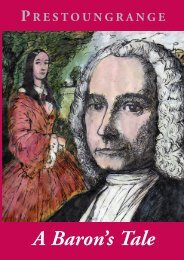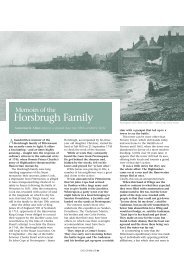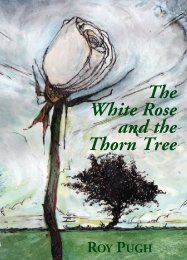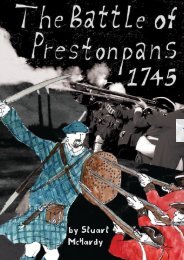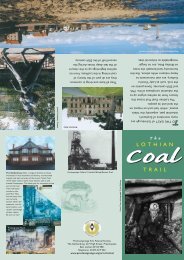Battle of Prestonpans 1745
Battle of Prestonpans 1745
Battle of Prestonpans 1745
You also want an ePaper? Increase the reach of your titles
YUMPU automatically turns print PDFs into web optimized ePapers that Google loves.
VICTORY AT PRESTONPANS<br />
concerns <strong>of</strong> this first <strong>of</strong> the Georges, and his son George II<br />
who came to the throne in 1727. George I failed to learn<br />
English, and his ungracious ways were perpetuated by his<br />
descendants.<br />
Conversely the unrest in Britain every now and then served<br />
in the interests <strong>of</strong> France and Spain. The French first<br />
intervened on behalf <strong>of</strong> the Jacobites in March 1689 when<br />
they deposited James on the coast <strong>of</strong> Ireland together with a<br />
body <strong>of</strong> 4,000 French troops. The fight <strong>of</strong> the Irish Jacobites<br />
outlasted the resistance in Scotland and the departure <strong>of</strong><br />
James, and came to an end only when the defenders <strong>of</strong><br />
Limerick surrendered on favourable terms on 3 October 1691.<br />
The celebrated Jacobite rising <strong>of</strong> 1715 was in measurable<br />
terms the largest <strong>of</strong> all, embracing much <strong>of</strong> northern England<br />
and Lowland Scotland, but it lacked cohesion and leadership.<br />
It was launched at a time <strong>of</strong> general European peace when<br />
neither France or Spain were inclined to intervene. In 1719 the<br />
Spanish indeed put a small force ashore in the Western<br />
Highlands, but the troops and their Scottish supporters made<br />
scarcely any progress inland before they were defeated at<br />
Glenshiel on 10 June. The Scots dispersed and the Spaniards<br />
were left to surrender.<br />
In the longer term the Jacobite connections with Spain and<br />
more particularly with France proved to be a source <strong>of</strong><br />
underlying strength, as was to be revealed in <strong>1745</strong>. Exiled<br />
Irish Jacobite shipowners, rich from the pr<strong>of</strong>its <strong>of</strong> trade,<br />
slaving and privateering, proved willing to put their resources<br />
at the disposal <strong>of</strong> a new Stuart leader, Prince Charles Edward<br />
Stuart. He was more single-minded and energetic than<br />
anything his House had produced in recent generations. A<br />
Stuart army in exile had come into being in the French<br />
military service in the shape <strong>of</strong> the formidable Irish Brigade<br />
and the Regiment <strong>of</strong> Royal Ecossais. Meanwhile the<br />
circulation <strong>of</strong> clansmen and young Highland gentlemen<br />
between Scotland and France and Spain helped to build a fund<br />
<strong>of</strong> military expertise available to the Scots Jacobites in their<br />
homeland.<br />
In 1743 a fresh war pitted France against Britain and her<br />
Austrian, Dutch and German allies at a time when a new<br />
generation was coming to the fore. On the theatre <strong>of</strong> war in<br />
the Austrian Netherlands (roughly corresponding with present<br />
day Belgium) the command <strong>of</strong> the British forces passed to<br />
King George’s second and favourite son William Augustus,<br />
Duke <strong>of</strong> Cumberland. He was brave and enthusiastic but he<br />
2



